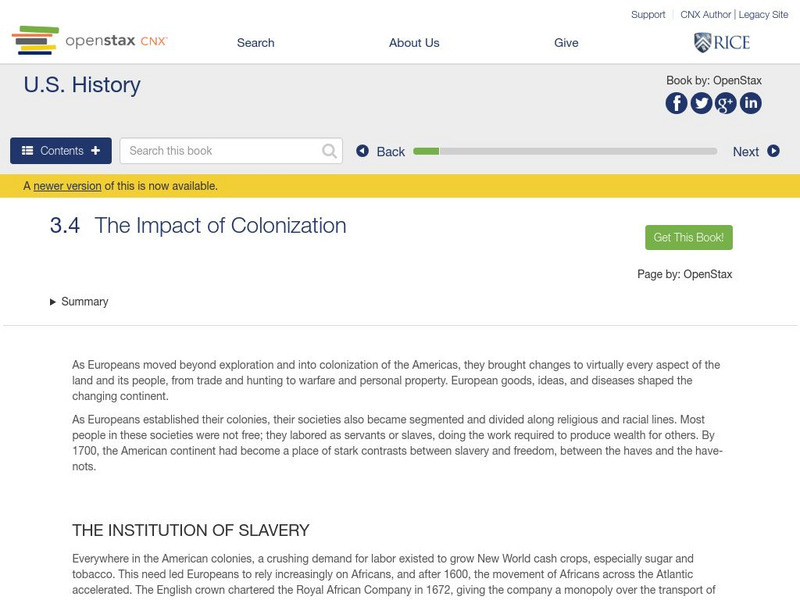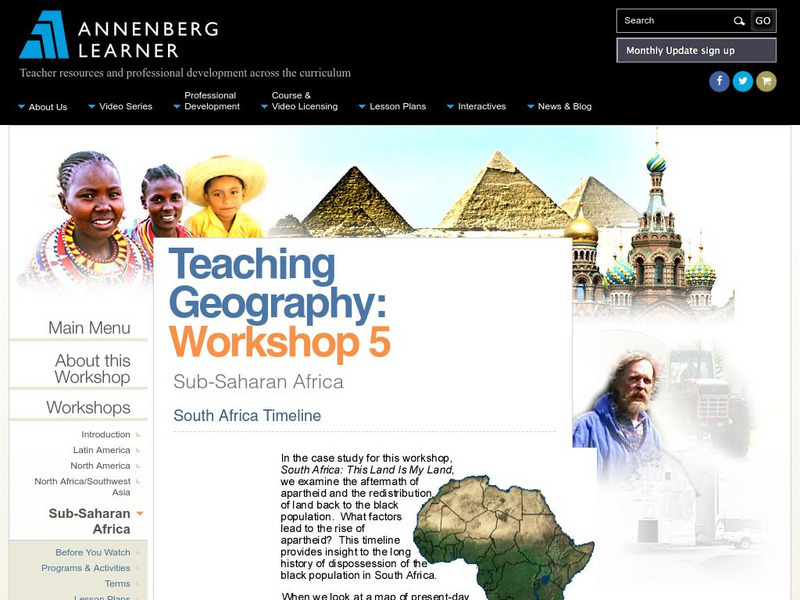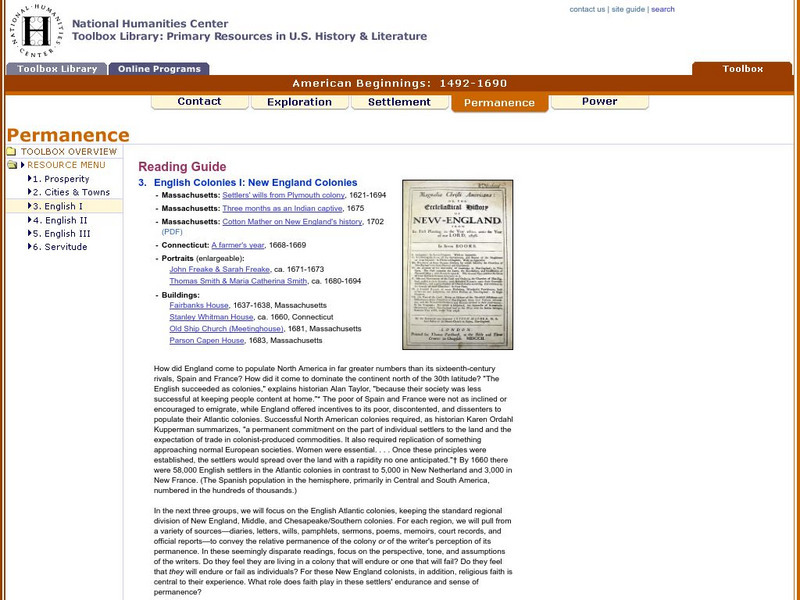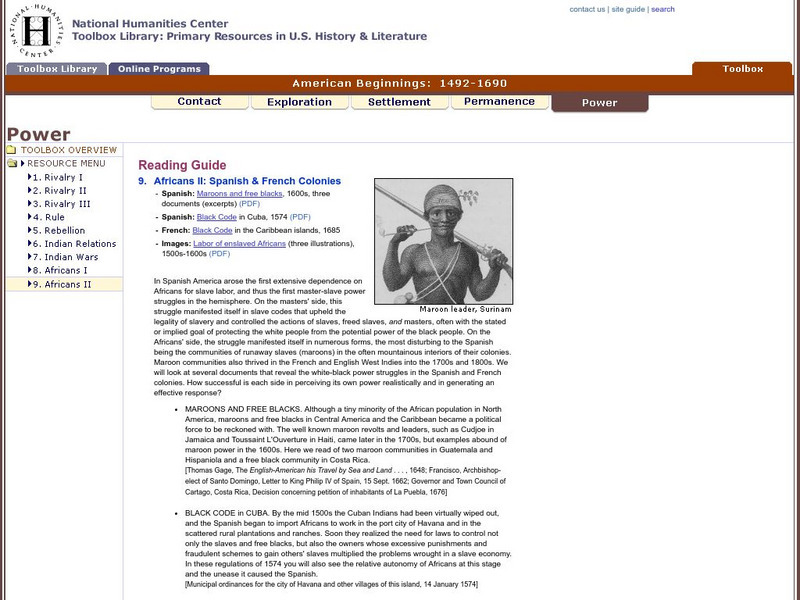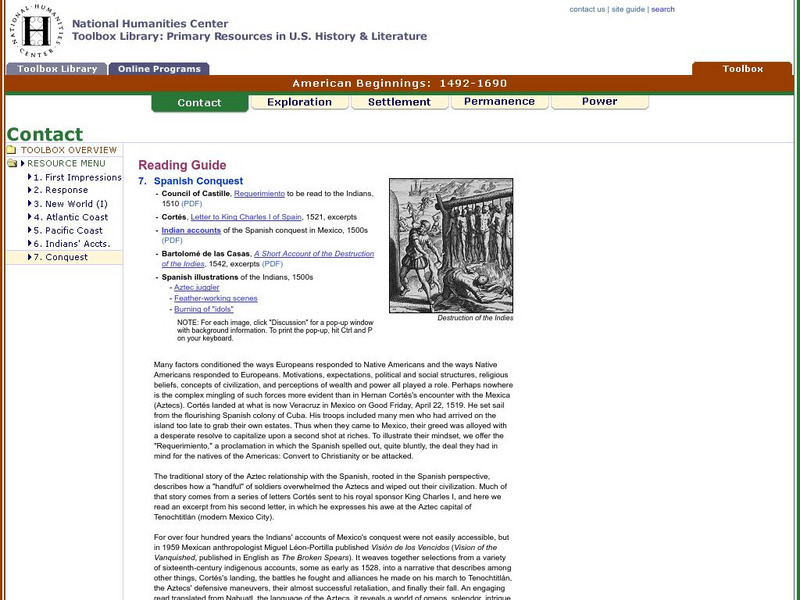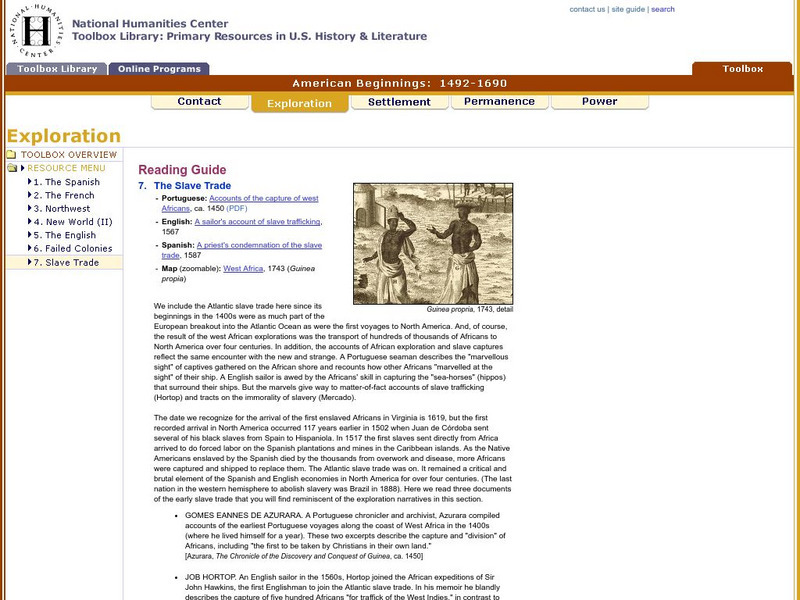Other
Bringing History Home: Native American History
This 5th grade unit is an introduction to Native American history in the 19th and 20th centuries. The lessons focus on U.S. government policies that have determined the official relationship between the government and Native American...
OpenStax
Open Stax: The Impact of Colonization
By reading this section of a chapter on "Colonial Societies," students will be able to explain the reasons for the rise of slavery in the American colonies, describe changes in Indian life, including warfare and hunting, contrast...
National Endowment for the Humanities
Neh: Edsit Ement: The First Great Awakening
In the middle of the 18th century, a series of evangelical religious revival movements swept across colonial America. Known as the First Great Awakening, the movements were characterized by emotional religious conversions from a state of...
Ohio History Central
Ohio History Central: French and Indian War
The struggle for territory between the European countries led to the French and Indian War. This war had far-reaching consequences for the colonists and Great Britain. Discover reasons the war began and how the end of this war eventually...
Curated OER
Educational Technology Clearinghouse: Maps Etc: Africa, 1897
Map of Africa in 1897 showing European colonial possessions and spheres of influence, and the independent territories at the time. The map is color-coded to show the areas controlled by the British, French, German, Turkish, Italian,...
Curated OER
Educational Technology Clearinghouse: Maps Etc: Central Africa, 1920
A map of central Africa in 1920 showing the European colonial claims at the time.
Curated OER
Unesco: Saint Kitts and Nevis: Brimstone Hill Fortress National Park
Brimstone Hill Fortress National Park is an outstanding, well-preserved example of 17th- and 18th-century military architecture in a Caribbean context. Designed by the British and built by African slave labour, the fortress is testimony...
University of Groningen
American History: Outlines: The Literature of Exploration
Had history taken a different turn, the United States easily could have been a part of the great Spanish or French overseas empires. Its present inhabitants might speak Spanish and form one nation with Mexico, or speak French and be...
Curated OER
Fort Caroline, 1564
Three European accounts of the disappointments, challenges, and outright failures to establish early successful colonial outposts in North America.
Curated OER
Slideshow
Fifty seven primary sources-historical documents, literary texts, and visual images-and one secondary historical account that explore imperial conflict, European economic rivalry, and the impact of colonial rule on native peoples.
PBS
Pbs Learning Media: Primary Source Set: Spanish Missions in California
A collection that uses primary sources to explore the history of Spanish missions in California.
Blackdog Media
Classic Reader: The Tempest by William Shakespeare
This is the full text of the five-act play The Tempest by William Shakespeare including a list of characters and an epilogue.
PBS
Pbs Learning Media: Primary Source Set: Latin American Revolutionaries
This collection uses primary sources to explore leaders of Latin American revolutions.
PBS
Pbs Learning Media: Primary Source Set: Dutch New Netherland
This collection uses primary sources to explore the Dutch colony of New Netherland.
PBS
Pbs Learning Media: Primary Source Set: Powhatan People and English at Jamestown
This collection uses primary sources to explore the encounter between the Powhatan people and English at Jamestown.
Countries and Their Cultures
Countries and Their Cultures: Pokot
During the colonial period, the Pokot were called "Suk" by Europeans. To some Pokot, the older designation is a reminder of an era in which Africans lacked the power to name themselves; to others, it represents the clever ruse of a...
University of Illinois
University of Illinois: Early American Trade With China: Europe's Economic Tradition [Pdf]
Most well-educated American colonists (including early American leaders like Thomas Jefferson, James Madison, and Benjamin Franklin) were familiar with the writings andideas of European scholars, so it makes sense that Americans came to...
Annenberg Foundation
Annenberg Learner: South Africa Timeline
This timeline provides insight into the long history of struggle of the black population of South Africa. Follow the centuries of European wars and colonial rule and the policies that led to apartheid.
National Humanities Center
National Humanities Center: Toolbox Library: Enslaved Peoples, American Beginnings: 1492 1690
Two Spanish accounts of enslaved Indians in the Caribbean and enslaved Africans in Mexico and statements of the difficulty of maintaining slavery and the lurking threat of a slave revolt.
National Humanities Center
National Humanities Center: Toolbox Library: English I, American Beginnings: 1492 1690
Portraits of early New Englanders as well as four buildings from seventeenth-century New England that accompany accounts in those British colonies of struggles, Indian hostilities, and economic success.
National Humanities Center
National Humanities Center: Toolbox Library: Rivalry Iii, American Beginnings: 1492 1690
Two maps of English and French rivalries in North America, and two side-by-side accounts of the English and French perspectives on King William's war over power, trade, and economic dominance of the continent.
National Humanities Center
National Humanities Center: Toolbox Library: Africans Ii, American Beginnings: 1492 1690
Three illustrations and five documents about slave codes, master-slave power dynamics, and free blacks within French and Spanish settlements of the Caribbean.
National Humanities Center
National Humanities Center: Toolbox Library: Conquest, American Beginnings: 1492 1690
A series of illustrations and accounts of Spanish conquest of Indians that reflect the fascination with and the brutality directed against native cultures.
National Humanities Center
National Humanities Center: Toolbox Library: Slave Trade, American Beginnings: 1492 1690
A West African map and three accounts of the development of slave acquisition display the process and the brutality of the Atlantic slave trade.



